Nigerians are dying “daily” in the name of democracy and religion as socio-economic and political conditions in the country worsen, says the Catholic Archbishop of Sokoto Diocese, Rev. Matthew Kukah.
Mr Kukah stated this at the National Peace Committee High-level Discourse on Religion and Democracy organised by The Kukah Centre with support from the European Union on Tuesday in Abuja.
Mr Kukah called on religious leaders to provide moral guidance for sustaining Nigeria’s democracy.
“Our conversation today is aimed at just looking at the intersection between religion and democracy.
“In reality, when you look at the kind of indicators and what democracy ought to be able to deliver, there is a correlation between that and the need for us to have a moral foundation on which to build some of these principles,” said the Catholic priest.
Mr Kukah added, “Yet we know that, in the name of democracy, Nigerians are dying daily. In the name of religion, Nigerians are dying daily.
“So something must be wrong. The challenge for us is to try and find that nexus.”
The European Union ambassador-designate to Nigeria, Gautier Mignot, said the EU was keenly supporting freedom of religion and belief globally and at national levels.
“EU supports democracy through a flagship programme called ‘Support for Democratic Governance in Nigeria’, implemented in collaboration with various organisations.
“It focuses on building strong, effective and legitimate democratic institutions, complementing the efforts of the Nigerian government and people to improve and strengthen democracy,” said Mr Mignot.
According to Mr Mignot, the EU promotes freedom of religion and belief through support for efforts to create an environment where everyone would practice their religion freely without fear of persecution in Nigeria.
The speaker of the House of Representatives, Tajudeen Abbas, condemned faith-based organisations that often play perverted roles in mobilising citizens towards social justice initiatives and humanitarian efforts.
“The intertwining of religion and politics often complicates governance and can lead to polarisation among our citizens. It is crucial that we recognise these dynamics as we strive for a more inclusive democracy.
“One of the primary challenges facing our democracy is the politicisation of religion,” he stated.
Meanwhile, Senate President Godswill Akpabio noted that “too often we have seen religion misused as a tool for division and strife, the dangers posed by violence and intolerance threatens to undermine our democratic values and the principles that hold our society together.”
Mr Akpabio added, “We cannot ignore the pain and suffering caused by religious conflict in the world, pain that disrupts lives, tears apart families, and stifles progress.
“As Mahatma Gandhi wisely said, quote, an eye for an eye only ends up making the whole world blind. We must remember this truth as we seek to break the cycle of violence.”
(NAN)






